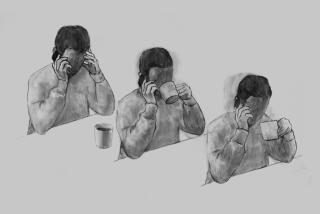Comforted by ‘Life in the Balance,’ Thomas Graboys’ memoir on Parkinson’s and dementia
- Share via
I gasped when I saw the subtitle of Thomas Graboys’ new memoir, “Life in the Balance: A Physician’s Memoir of Life, Love, and Loss with Parkinson’s Disease and Dementia.” My father, also a physician, carries these same diagnoses.
Graboys has been dealt a bad hand. Once a top cardiologist in Boston and an expert in doctor-patient interaction, Graboys lost his first wife in 1998 and developed early Parkinson’s a few years later.
Parkinson’s, caused by progressive damage to the brain’s substantia nigra region, progressively interferes with one’s ability to move. Some patients develop a tremor of their extremities, further interfering with motion.
“I often appear hunkered down,” Graboys writes, “head bowed, shoulders slumped, my once-fluid body rigid, my once-graceful gait an old man’s shuffle.” As is characteristic of Parkinson’s patients, Graboys has good days and bad; medications alleviate his symptoms. But his body is inexorably deteriorating.
Thanks to the candor of celebrities such as Michael J. Fox, these details about Parkinson’s are fairly well-known. But the public is less familiar with the fact that roughly half of Parkinson’s cases are accompanied by Lewy body disease, a gradual dementia resembling Alzheimer’s.
The combination of the two, as Graboys describes, is brutal: physical disability accompanied by periods of disorientation and memory loss. There are, however, also hours and days of great clarity.
On a recent visit home, I had vivid insight into what Graboys describes. My father spoke clearly about the upcoming election but misremembered recent events. The nights were especially bad, full of fitful sleep and hallucinations. One night he fell backward onto the floor. Thankfully, he was not hurt.
Like my mother, Graboys’ family has been devastated by the effect of his disease. It has not been easy for Graboys’ second wife, Vicki, and his children to care for someone who now needs assistance in all aspects of life and is at constant risk of hurting himself. “From the center of our family on out,” he writes, “sadness rules the day.”
To his credit, Graboys does not shy from ethical issues raised by his illness. First, he did not tell Vicki how sick he was before their marriage. Second, he practiced medicine well into his illness -- perhaps too long.
These unusual disclosures are accompanied by sound advice for all seriously ill people: Live with grace; be honest with yourself; unburden yourself of anger; exercise; read the paper; and, if it suits you, reaffirm your faith in God.
And, if you can, write a book. Graboys calls his book “the only way I know to continue to be a doctor.”
My father is too sick to write his own book, but we have our smaller goals. With a little luck, he will travel 500 miles later this month for his granddaughter’s bat mitzvah.
Barron H. Lerner, professor of medicine and public health at Columbia University Medical Center, is the author of “When Illness Goes Public: Celebrity Patients and How We Look at Medicine.”
More to Read
Sign up for our Book Club newsletter
Get the latest news, events and more from the Los Angeles Times Book Club, and help us get L.A. reading and talking.
You may occasionally receive promotional content from the Los Angeles Times.










